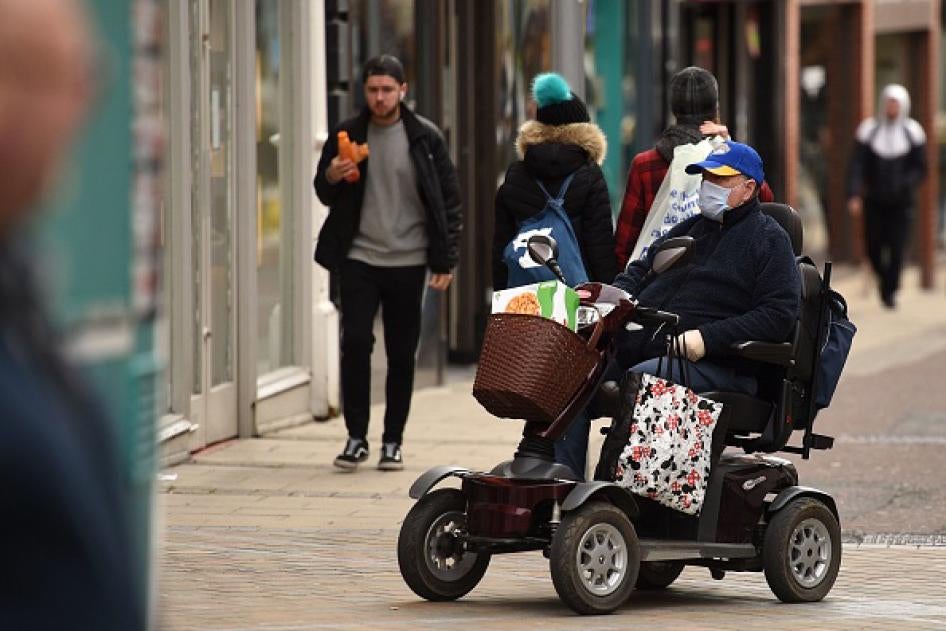(London) – UK’s Coronavirus Act, which becomes law today, has serious implications for the rights of people with disabilities and older people, and its implementation needs to be carefully monitored to protect people’s rights to health care, education, and freedom, Human Rights Watch, the UK National Survivor User Network (NSUN), and international human rights expert Gerard Quinn, said today.
The legislation gives the UK authorities emergency powers to address the unprecedented coronavirus pandemic and needs to be renewed by parliament every six months.
“These are unprecedented times, but weakening the safeguards in an already coercive Mental Health Act, and extending its powers, is a grave step and risks the rights of people with disabilities,” said Akiko Hart, CEO of NSUN. “Given the serious implications of the Coronavirus Act for some of the people it seeks to protect, it’s vital that the government ensure that the new law doesn’t undermine rights and do lasting harm.”
Some emergency powers, such as restrictions on public gathering and transport, may be justified amidst the continuing spread of the disease. Additional powers, however, including detaining people suspected of being infected with COVID-19 for testing and making it easier to detain people on mental health grounds, create the potential for violations to fundamental human rights.
The new law will likely worsen the situation of people with disabilities in an already difficult context, the groups said, especially given cuts in social care and disability benefits and existing abuses against people with disabilities.
The law changes mental health assessments in England and Wales, lowering the threshold for detention on mental health grounds (known as sectioning), by requiring only one doctor’s recommendation. The Mental Health Act requires two doctors’ recommendations, which provides at least some safeguards against abuse of power.
Mental health advocates, including the National Survivor User Network, have raised a number of other concerns.
The new law extends time limits on detaining people in a mental health setting and removes the requirement of a second opinion for individuals forced to take psychiatric medication against their will under the Mental Health Act.
Currently the Care Quality Commission receives about 16,000 requests for formal second opinions every year, and in 2018-19 changed treatment plans in 29 percent of their requests. Removing these safeguards in relation to consent to treatment may be in breach of Article 8 of the Human Rights Act.
The weakened detention safeguards are likely to disproportionately impact people from Black, Asian and Minority Ethnic (BAME) communities. A 2019 independent review of mental health legislation found members of BAME communities are overrepresented in detention, have longer than average lengths of stay in psychiatric hospitals, and are eight times more likely to be subject to involuntary outpatient treatment.
The emergency law also relaxes the rules and standards for social care services and supports, essentially suspending the Care Act 2014 duties in England to assess and arrange services to meet the needs of adults with disabilities and their carers. This would significantly impact older people, people with learning disabilities, and other people with disabilities who are living in the community. Further, local authorities would no longer have to comply with care and support plans once people with disabilities are discharged from residential facilities, leaving them at risk of neglect at home.
“Support for thousands of people with disabilities and older people does not need to be sacrificed to fight the current COVID-19 crisis,” said Shantha Rau Barriga, director of Disability Rights at Human Rights Watch. “These are the groups among the most at risk in this pandemic; they should not also be at risk because of the response.”
States can take extraordinary measures to limit some rights in the name of public health and emergencies threatening the life of a nation. But such measures need to be strictly necessary and proportionate to meet the situation, and at no times should be arbitrary or discriminatory. The fundamental rights of detainees should also always be protected even in emergencies.
NSUN, together with Human Rights Watch and Professor Quinn, are calling for the UK to establish clear mechanisms to monitor the impact on rights of the weakened safeguards in mental health legislation and suspension of the elements of the Care Act. These should set out the duty to support those in need of care and to report to the UK Parliament every three months. That reporting should be assessed by the UK Parliament if it is asked to renew the legislation.
“Emergencies demand a tailored and efficient response. But there are limits, including trampling on existing rights and protections, especially for groups at higher risk of COVID such as people with disabilities and older people,” said Gerard Quinn, professor of law at the University of Leeds and at the Wallenberg Institute in the University of Lund, Sweden. “If we are not careful, such emergency measures can become Trojan horses to needlessly erode established protections.”









